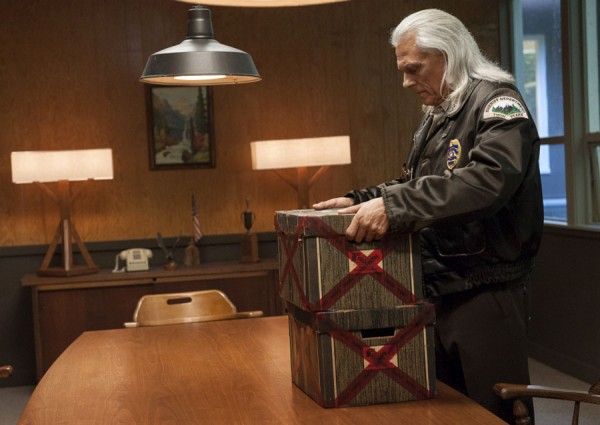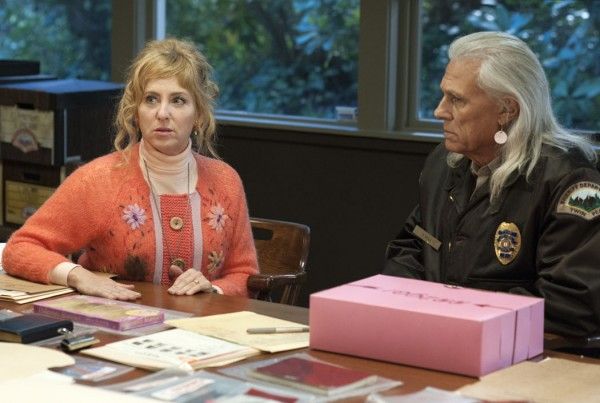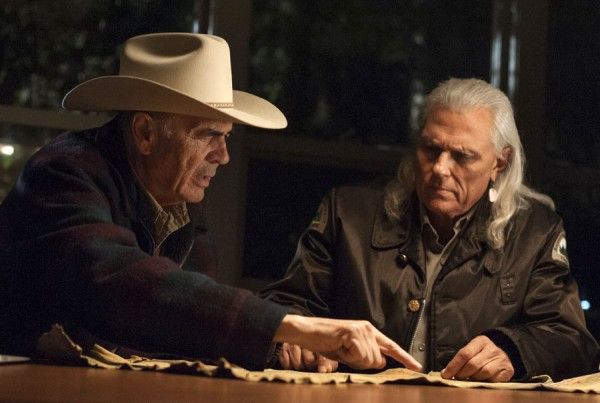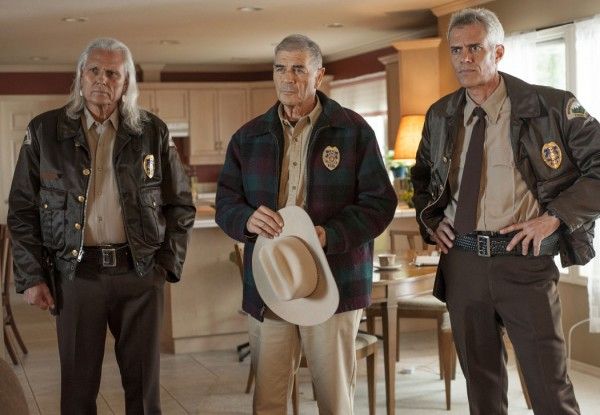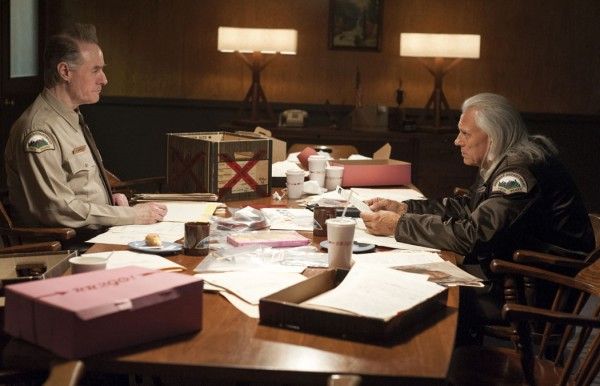Directed entirely by David Lynch, the 18-part Showtime limited events series Twin Peaks: The Return picked things up 25 years after the inhabitants of a quaint northwestern town were stunned by the shocking murder of their homecoming queen, Laura Palmer (Sheryl Lee). While viewers are catching up with many familiar characters and learning about where their lives are now, they’re also getting a glimpse into some new characters, living their lives in other locations around the country.
During this 1-on-1 phone interview with Collider, actor Michael Horse (who plays Deputy Chief Hawk) talked about how Twin Peaks changed the face of television, why it’s okay not to fully understand what’s going on, how much he’s enjoyed returning to this character and world, getting to say goodbye to Catherine Coulson (aka the Log Lady), working with his co-stars in the sheriff’s station, how fun it is to be at the center of it all this season, and what he’s most proud of, when it comes to the series.
Collider: It’s such a pleasure to talk to you about Twin Peaks, which is my all-time favorite TV series!
MICHAEL HORSE: It changed the face of television. All the things that I really like now – American Gods, Legion, Fargo and Preacher – all have Twin Peaks’ DNA all over them.
It also taught viewers that it’s okay to not necessarily know what’s going on.
HORSE: Well, yeah! I tell people that just ‘cause I don’t understand sometimes what’s going on in Twin Peaks, it doesn’t mean that there’s not things going on. It took me 25 years to actually get it, and being a real good friend of Mark [Frost’s] and reading the book. The two things that made me understand David [Lynch] was reading The History of Twin Peaks and seeing the documentary on David’s early life. It was very insightful to who he is, as a human being.
If someone had told you, when the original series wrapped, that you’d return to the world of Twin Peaks and this character, so many years later, would you have thought that person was completely insane, or would that not have surprised you?
HORSE: I thought it was dead, and part of me said, “Well, that’s good.” It was a James Dean kind of thing. It did what it did, and then it was gone. People would ask, “Is it gonna come back?” And I’d be like, “I don’t think so.” But, it took 25 years to do it. I thought to myself, “There’s so many out-of-the-box things on TV now, it’s not gonna be that big of a deal.” A couple of days of working and I went, “Oh, I forgot!” With Episode 8, I went, “Here we go!” The first time I did it, I knew things were going on, but this time, I really realized how deep of an artist David is. For me, as an actor and as an indigenous actor, you don’t get chances to do art on television. It’s pretty much the same stuff, over and over. And Hawk is a really, really interesting Native character. I live in the Bay Area and I’m the most un-New Age guy, but nature is a living entity and I understand that. There’s spirit going on in those things.
Because Twin Peaks truly is so much more than a TV series and some of it really feels like it should be in a museum somewhere, when you started working with David Lynch, did you know just how much of an artist he actually is?
HORSE: I knew from the get-go. Russ Tamblyn was my neighbor, and Dean Stockwell, and they showed me stuff that David did, a long time ago. It’s funny, I never wanted to be in the movies. I got into it all by accident. I was renting my first art studio from an agent who handled Jack [Nance]. Jack would explain a lot of stuff when we were filming. Everything made sense through Jack’s eyes. I dearly miss him. But, I knew from the beginning. David and I did a little film, called The Cowboy and the Frenchman, for the French bicentennial. I asked David, “What are you going to do next?” He said, “A TV series.” I said, “For cable?” And he said, “No, for network.” And I was like, “Okay!” So, when [Twin Peaks] came back, I would have been pleased to have a cameo and just to be a part of it, but they’ve been very generous with my character. I got to say goodbye to the Log Lady. That, alone, was worth it. It’s been pretty amazing! My career is an experiment in the bizarre. I’ve had an interesting career for somebody who never really wanted to be in the movies. And my wife didn’t know anything about film, but she watches and says, “Now, I get it. Look at the lighting and the pacing.” There were people from the crew that came out of retirement just to work with David, one more time. There were directors and writers that knew we were filming in L.A., who would come by and say, “Can we just shake his hand?” David is a kind man. And Mark and I are friends. I have deep respect for Mark. Mark has a lot of insight into who Hawk is.
Some of my favorite moments this season have been the ones that you and Catherine Coulson share, but you didn’t even get to act together in the same room. What was it like to be able to have her be a part of this, and then to see those moments play out?
HORSE: She was my friend. We were really close. Even though I’m just hearing her voice, it brings back a lot of memories. I’m not the greatest actor in the world, but when I’m listening to her, I’m deeply involved in that conversation. It’s pretty sincere, my talking with her. When I said goodbye, I’m really telling her goodbye, wherever she is in the spirit world. It was a true joy to do.
How was it to have your own little ensemble of actors in the sheriff’s station, with Dana Ashbrook, Robert Forster, Harry Goaz and Kimmy Robertson? Did you feel like your own little team?
HORSE: It was great! Robert Forster is a legend. It’s like working with [Robert] De Niro. I was taking him to lunch and asking him about his whole life, and he was so sweet. He would look at me like, “I don’t get this.” And I’d go, “I don’t know if you’re gonna get it.” Finally, he said, “Oh, you and I are the straight guys!” Once Robert realized what he was doing, he had great joy in doing it. Robert is an artist, in his own right. He was supposed to be the original sheriff. He was a joy. And Kimmy and I still talk, all the time. Harry had disappeared off the radar. He was herding cattle, or something, so it was great to see him again. And to see how Dana has grown, as a person and as a character, was wonderful.
What is the best or most memorable bit of direction that David Lynch has ever given you?
HORSE: David doesn’t really give me any direction. Once in awhile, he’ll say, “Could you say it like this?” He directs in his own way. It’s like being part of one of David’s paintings. It’s a very organic process. He will direct, if things are not going in the direction that David sees it in his vision. He’s a great director.
Since Kyle MacLachlan was the only one who got to read the full script and everyone else was only given the specific scenes that they were in, what was your reaction to learning what your arc would be and did you even fully grasp how that would fit into what the overall story would be?
HORSE: I’m in the finale and I can’t really explain it to you. I have the great insight of knowing who Hawk is, so I just go with that. I know how Hawk is going to deal with things.
Is it fun to get to be the guy that’s at the center of it all, this season?
HORSE: Oh, yeah, it’s a ball! There are things going on, like in Vegas, that I have no clue about. Michael, the actor, doesn’t know what’s going on, but I have a real insight into Hawk, and Hawk knows what’s going on. I think of it as, “How does Hawk feel about this?” Hawk knows that there’s more. He’s one of the very few people in the Twin Peaks world that really knows the levels of what’s going on. He knows the past, he knows the dimensions, he knows the evil that exists in the human condition, and he’s not afraid of the future. As indigenous people, our future has been so tampered with and stepped on, but we still survive. We’re still here and we’re growing. We have an acceptance of the future.
When it comes to Twin Peaks, what are you most proud of, as far as what you were able to do in the series?
HORSE: I’d say changing the way that people process television. There were changes in format and changes in dialogue in certain shows, but not in the actual physical way that you experience television. So much of the new TV owes it to Twin Peaks kicking that door open. You’re getting a chance to see something on that screen that you’ve never experienced.
Twin Peaks airs on Sunday nights on Showtime.


